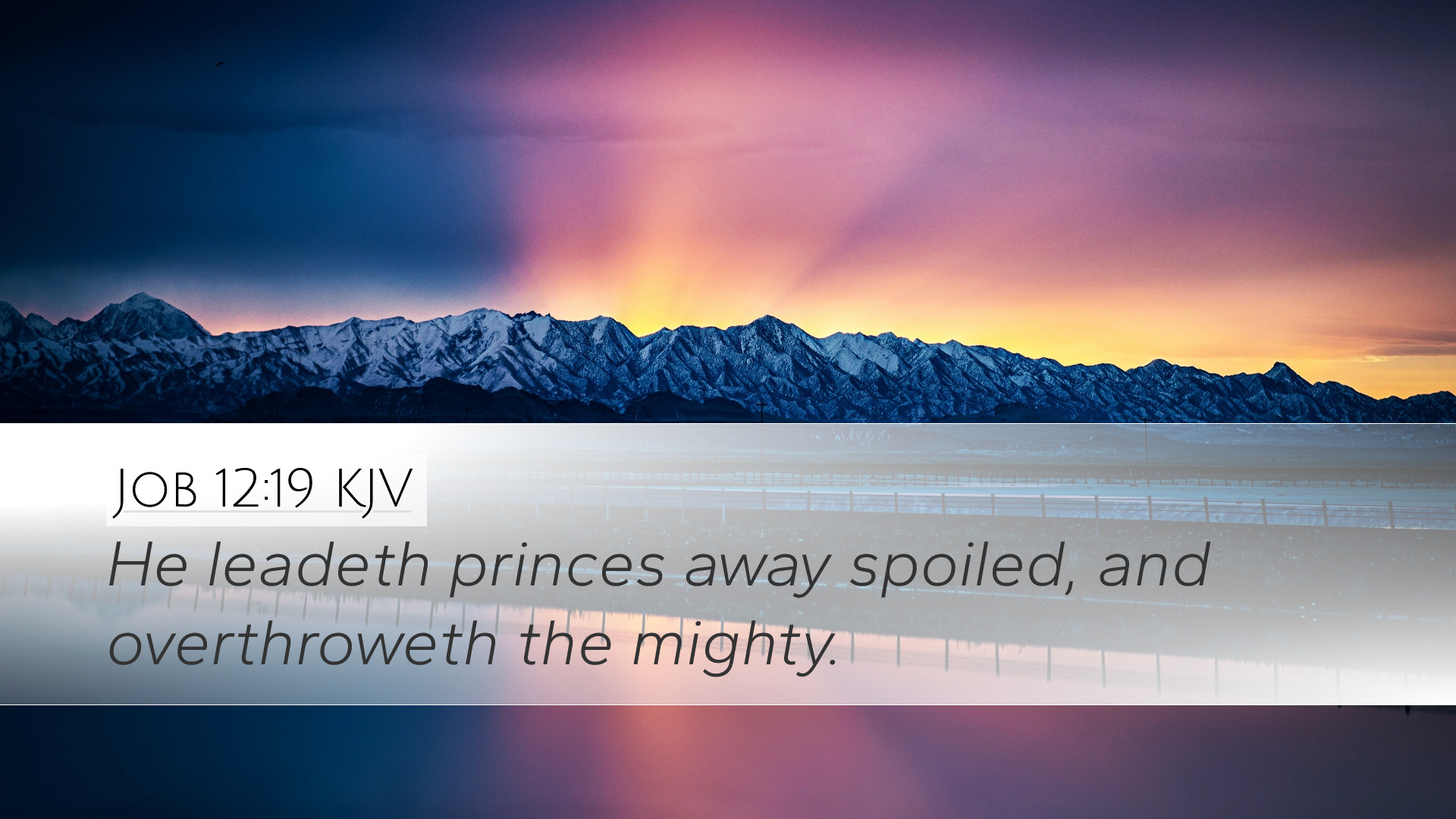Old Testament
Genesis Exodus Leviticus Numbers Deuteronomy Joshua Judges Ruth 1 Samuel 2 Samuel 1 Kings 2 Kings 1 Chronicles 2 Chronicles Ezra Nehemiah Esther Job Psalms Proverbs Ecclesiastes Song of Solomon Isaiah Jeremiah Lamentations Ezekiel Daniel Hosea Joel Amos Obadiah Jonah Micah Nahum Habakkuk Zephaniah Haggai Zechariah MalachiJob 12:19
Job 12:19 KJV
He leadeth princes away spoiled, and overthroweth the mighty.
Job 12:19 Bible Commentary
Commentary on Job 12:19
Verse Context: Job 12:19 states, "He leads princes away stripped, and overthrows the mighty." This verse is part of Job's response to his friends, asserting God's absolute sovereignty over human affairs and highlighting the humility of human status in contrast to divine authority.
Insights from Public Domain Commentaries
Matthew Henry's Commentary
Matthew Henry emphasizes that God's power is not limited to the spiritual realm but extends into the hearts and actions of rulers and nations. He notes that:
- Divine Sovereignty: God's overruling providence governs the world, and He can strip leaders of their power at will, illustrating His control over all creation.
- Human Frailty: No matter how mighty a person may appear, they are subject to divine judgment and can be humbled in an instant.
- Encouragement for Suffering: For Job, in his suffering, this acknowledgment serves as a comfort, reminding him that God is ultimately in control, even when circumstances appear bleak.
Albert Barnes' Notes
Albert Barnes offers an analytical approach to understanding the implications of Job 12:19. He interprets the verse as follows:
- Princes and Mighty: The terms 'princes' and 'mighty' represent the elite and those who uphold power. Barnes asserts that God can bring them low, illustrating that earthly authority is temporary and precarious.
- Judgment and Justice: Barnes connects this verse to a broader theme of divine justice, affirming that God, as the ultimate judge, has the right to elevate or overthrow leaders based on their actions.
- The Ultimate Reality: This verse provides a sobering reminder of the ultimate reality that all humans, regardless of their achievements, are accountable to God.
Adam Clarke's Commentary
Adam Clarke delves deeper into the poetic structure and meaning of Job's proclamation. He notes that:
- Literary Style: Job employs vivid imagery to express the transient nature of power and status. The striking language serves to reinforce the point that human pride is foolish when juxtaposed against God’s majesty.
- Theological Implication: Clarke highlights the theological implications concerning God's governance. He posits that every calamity or elevation is underpinned by a purpose in God’s sovereign plan.
- Call to Humility: This verse serves as a call to humility for both the afflicted and the powerful, urging all to recognize their ultimate dependence on the Creator.
Theological Reflections
Job 12:19 invites deep theological reflection on several key themes:
- The Sovereignty of God: Understanding that God operates beyond human comprehension and that His purposes transcend earthly plans.
- The Nature of Authority: An exploration of how authority is administered on earth and how it is ultimately derived from God's will.
- Human Accountability: The reminder that all individuals, regardless of their status or power, will stand accountable before God.
Application for Pastoral Ministry
For pastors and leaders, Job 12:19 can inform preaching and teaching in several impactful ways:
- Hope in Despair: Encourage your congregation with the truth that even in the darkest times, God remains sovereign and in control.
- Encouragement of Humility: Foster discussions on humility, reminding leaders and members that power is fleeting and ultimately, we all rely on God's grace.
- Justice and Integrity: Appeal to the principles of justice and integrity as leaders navigate their roles, holding themselves accountable to God’s standard.
Conclusion
Job 12:19 compels readers to acknowledge the supremacy of God in all matters of life, especially in governance and authority. The insights drawn from the commentaries of Matthew Henry, Albert Barnes, and Adam Clarke underscore the need for a humble reliance on divine wisdom and the recognition of God's ultimate plan in our lives. As believers engage with this text, they are challenged to reflect on their positions, their responsibilities, and the sovereignty of the God they serve.


